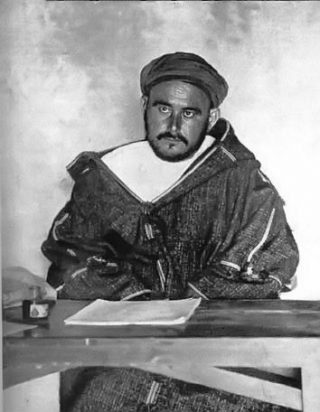Mohammed Abdelkrim El Khattabi “Abd el Krim”
Mohammed Abdelkrim El Khattabi, also known as Abd el Krim, was a prominent leader and nationalist figure in the early 20th century. Born on 1882 in the Rif region of Morocco, Abd el Krim played a crucial role in the Moroccan struggle for independence from Spanish and French colonial rule. His efforts and influence had a lasting impact on the trajectory of Moroccan history.
The Early Years
Abd el Krim was born into a Berber family and grew up in the Rif region, which was under Spanish control at the time. He received his early education in a local mosque and later continued his studies in Fes, one of the intellectual and cultural centers of Morocco. It was during this time that Abd el Krim developed a deep sense of nationalism and a desire to liberate his people from foreign domination.
Resistance against Colonial Rule
The Rif region, under Spanish occupation, faced severe economic exploitation and political repression. Inspired by the nationalist movements across the world, Abd el Krim took it upon himself to lead the resistance against the colonial rule. He mobilized the local population and organized a guerrilla warfare campaign against the Spanish forces, successfully repelling their advances.
The Rif War, as it came to be known, lasted from 1920 to 1926. Abd el Krim’s leadership and strategic genius allowed the Rifian resistance fighters to achieve significant victories against the better-equipped Spanish forces. The Rifian fighters, under his command, employed innovative tactics that caught the Spanish off guard and weakened their hold on the region.
The Battle of Annual
One of the most significant events of the Rif War was the Battle of Annual in 1921. Abd el Krim led a well-coordinated attack on a Spanish garrison located in the town of Annual. The Spanish army, caught by surprise, suffered a devastating defeat, with thousands of soldiers killed or captured. This victory boosted the morale of the Rifian fighters and attracted international attention to the ongoing conflict.
Formation of the Rif Republic
As the Rifian resistance gained momentum, Abd el Krim established the Rif Republic in 1923, with its capital in Ajdir. The republic aimed to establish an independent and sovereign state in the Rif region, free from foreign control. Abd el Krim’s leadership and his vision for self-determination inspired many Moroccans and garnered support from various quarters.
The Rif Republic implemented various social and political reforms, including the introduction of modern education, healthcare systems, and land reforms. It also sought recognition from the international community, with Abd el Krim representing the Rif Republic in diplomatic negotiations with foreign powers.
The End of the Rif Republic
Despite its initial successes, the Rif Republic faced numerous challenges. The Spanish and French colonial powers, alarmed by the growing influence of Abd el Krim, launched a joint military campaign to suppress the revolt. The superior firepower and resources of the colonial forces eventually overwhelmed the Rifian resistance, leading to the fall of the Rif Republic in 1926.
Abd el Krim and his followers were forced into exile, with Abd el Krim himself being captured and imprisoned in France. Although the Rif Republic was short-lived, it had a profound impact on the Moroccan nationalist movement and served as a symbol of resistance against colonialism.
Legacy and Impact
Abd el Krim’s leadership and struggle for independence left a lasting legacy in Moroccan history. His efforts paved the way for the broader nationalist movement in Morocco, which ultimately led to the country’s independence in 1956. Abd el Krim’s tactics and strategies during the Rif War also influenced other anti-colonial movements around the world.
Today, Abd el Krim is celebrated as a national hero in Morocco. His name is synonymous with bravery, resilience, and the fight against oppression. His story continues to inspire generations of Moroccans, reminding them of the importance of unity, determination, and the pursuit of freedom.
Conclusion
Mohammed Abdelkrim El Khattabi, also known as Abd el Krim, was a remarkable leader who fought tirelessly for the independence of Morocco. Through his strategic brilliance and unwavering commitment to his people, he led the resistance against Spanish colonial rule and established the Rif Republic. Although the Republic was eventually defeated, Abd el Krim’s legacy lives on, inspiring generations to fight for freedom and self-determination.
Frequently Asked Questions
1. What was Abd el Krim’s role in the Rif War?
Abd el Krim was the leader of the Rifian resistance against Spanish colonial rule during the Rif War. He mobilized the local population and employed innovative tactics to achieve significant victories against the Spanish forces.
2. What were the major achievements of the Rif Republic?
The Rif Republic, established by Abd el Krim, implemented various social and political reforms, including modern education, healthcare systems, and land reforms. It also sought recognition from the international community and represented the Rif Republic in diplomatic negotiations.
3. What led to the downfall of the Rif Republic?
The Rif Republic faced a joint military campaign by the Spanish and French colonial powers, which eventually overwhelmed the Rifian resistance. The superior firepower and resources of the colonial forces led to the fall of the Rif Republic in 1926.
4. How did Abd el Krim’s struggle impact Moroccan history?
Abd el Krim’s struggle for independence paved the way for the broader nationalist movement in Morocco. His tactics and strategies influenced other anti-colonial movements around the world and continue to inspire generations of Moroccans.
5. What is Abd el Krim’s legacy?
Abd el Krim is celebrated as a national hero in Morocco. His name is synonymous with bravery, resilience, and the fight against oppression. His legacy serves as a reminder of the importance of unity, determination, and the pursuit of freedom.
